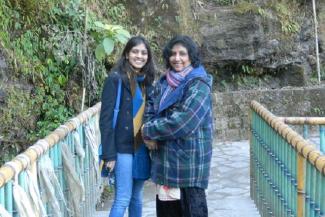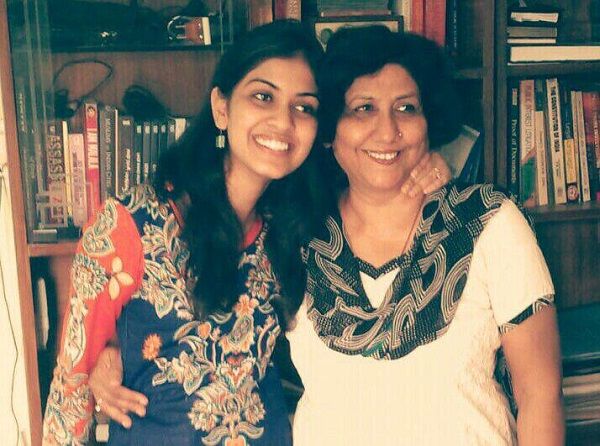
This mother-daughter interview takes us through a journey of a patient and caregiver, facing the turmoil of ovarian cancer diagnosis and treatment. Alina Rizvi is a resident of New Delhi, who has been taking care of her mother, Rabab Rizvi, a cancer patient for the last three years. Their journey has been tough, but a source of inspiration, affection and sheer joy that a mother-daughter relationship constitutes.
Please tell us a bit about your condition
Daughter - My mother was diagnosed with ovarian cancer in May 2015. She underwent a major debulking activity and a major chunk of the tumour was removed. However, there were traces of tumour to be seen in the colon and stomach which could not removed through surgery. Then began a 3-year long series of chemotherapy to get rid of these traces.
Please describe her experience of managing the illness.
Daughter - It has been an exhausting journey. Being one of the caregivers, it’s been challenging and demanding to tackle the illness and the fears it carries along.
What was the hardest part of the treatment? What kept you going? How has this changed your life perspectives and ambitions.
Mother - Hardest part is the ongoing chemotherapy, the associated side effects, uncertainty of the treatment’s outcome. My daughter and her son kept me going. Whenever I was low, I always reminded myself that my daughter needs me. She is a single child and we both always have a relationship of best friends more than just a mother-daughter. My grandson was born at the time when my tumour relapsed and was undergoing aggressive chemotherapy cycles. He brought more hope and strength in my life. I wanted to live more to see him grow. All of this has kept me going and still does.
I have become more conscious about health. I keep on telling my daughter to get annual health check-ups especially mammography and Pap smear. It's important to keep check on what you eat and what not and when in retrospect. I see my life and feel I should have done all this regularly.
What medications are you on?
Mother - I started with Paclitaxel and then switched to Avastin for almost 20 cycles. Later when I became resistant to Avastin I was shifted to combination therapy like Paclitaxel with Gemzar. Now with recent review of my tumour condition, I will be started on once in 3 weeks of Avastin along with ongoing combination therapy.
Have you tried complementary medicine or therapies, like homeopathy or yoga?
Mother - I tried homeopathy twice but it was more about treating the side effects rather than the disease. I later stopped taking homeopathy medicines voluntarily as I did not see any favourable outcome. For peace of my mind and my belief in God, I perform Namaz everyday and recite my prayers regularly. I feel this is my kind of meditation and gives me inner peace. This has been helpful as I can shut my mind for a while and just focus on one point.
Have you learnt anything in managing in your condition that you wish you knew before?
Mother - I wish I knew more about alternate therapies, like Tibetan treatment options. I feel if they are started off at right stage of cancer, along with allopathic medicine, they can give results.
What were some of the challenges you faced and what is your advice to patients who face similar challenges?
Mother - The recovery period after a major surgery is very challenging. Especially if it involves post-operative chemotherapy. So, keep your focus on improving the diet and physical mobility, one day at a time after the surgery. Otherwise the recovery might seem daunting. Recovering each day, will push you to try harder towards leading a healthier life.
Also, please get regular health check ups done, including Pap smear, mammography and cervical screenings. Otherwise, catching the disease at the right time becomes almost impossible. It was during one of my routine health check-ups that the cancer was detected, otherwise it might have gone unnoticed for a longer period.
Have you learnt anything in managing in your mother’s condition that you wish you knew before?
Daughter - I have learnt to develop patience and the importance of functioning in an autopilot mode, when dealing with an ill parent. Being a daughter, a full time mother, a wife and a working woman, does not allow me a lot of time for self-reflection and thought. Therefore, most of the time I’m ticking off items from my to-do-lists of the day.
In the past two years, I have learnt to develop an attitude that makes me perform my duties, but sometimes leaves me craving some quiet alone time. Time to self-reflect, think about my life and what actions can make me cherish time with my mother. I wish, I had learnt to value my time more through my lens than the society’s. That would provide me more wisdom to deal with my mother’s condition.
Have you had to make some changes to your lifestyle because of your mother’s condition?
Daughter - Definitely. I have learnt to do a lot more in 24 hours than I used to earlier. My free time is more about researching on new therapies and advances in cancer care, going through her reports, checking on her constantly, speaking to doctors and finding better referrals.
But most importantly, I have found value in not sweating over small stuff in life. When your parent is fighting a tough disease, you draw a lot of inspiration from their fight, but more importantly, view life in a larger perspective. A bad day at work, kid down with a cold, or cancelled vacation plan; these are minor things when compared to what my mother is going through. I try to filter out the smaller worries, to tackle the bigger issue, and that has definitely made me stronger in some aspects.
Has it been difficult emotionally to cope with your mother’s condition?
Daughter - I have always known that my mother is a fighter. She has faced hardships in her personal life and dealt with them with a smile. Even in the most difficult of scenarios, she has stood up, checked on everyone before attending to her emotional self. But now, I find myself in her situation, where I have to be her pillar of support. Times when she gets gloomy and is unable to tackle the weakness or eat properly, I have to lend her my emotional strength. Remind her of her stronger self. Needless to say, that often takes a toll on me and I feel fatigued. Often that comes off as irritation on others, which I am unable to reason out.
How has your family supported you? How did your friends treat you?
Mother - My husband, my siblings, my husband’s siblings and our close friends have been my strongest network of encouragement and support. They have ensured that I attend with all celebrations and occasions in our family, go out to watch movies when my health allows, meet with friends, and travel as well. All this has kept me going.
Daughter - My father has been my strongest support all this time. He not only takes care of his wife, but has stood up to help his daughter go through this time too. Talking to him instils in me the strength to keep up with life. My husband, and in-laws have been sources of constant support and love. And my two-year old son, is my source of joy. He lights up my day and also of my mother. I can see how much my happiness he brings to Mum’s life and I try to make him know her and spend time with her as much as possible.
Did you see a counsellor for support? Were you offered counselling by doctor?
Mother - Not initially. We never felt that we needed a counsellor as we all were well aware of my condition and how it's progressing. And for our society seeking a counsellor support is not taken very positively. It's more like either the family is not able to help or the patient is close to serious disease outcomes. Now last month after my daughter insisted, we reached out to a NGO that provides palliative care support and counselling. I have taken one session with them so far.
What was/is the hardest part of the treatment? What kept you going? How has this changed your life perspectives and ambitions?
Daughter - The fatigue and her inability to eat, has been my biggest concern throughout her treatment. Being on a regular chemotherapy regime deeply affects the total blood count, especially the platelets and white blood cells. If the platelets go down, my mother is unable to digest any solids and often experiences side effects like vomiting and diarrhoea. These are major concerns which can lead to further complications if not attended to at the right time. Often, my mother has been admitted in emergency due to these side-effects, which have been the most trying nights. The unease, the anxiety and the fear of what the test results might say, is difficult to handle.
It has been my mother’s conviction to go through these trying days that has kept me going on. Even in the hospital, she tries to manage most of the personal tasks on her own, calls up her siblings and remains active on WhatsApp. I look at her and think, if she can manage all this, then clearly I need to get my act right too.
What have been the biggest lessons that you’ve learnt on this journey?
Mother and Daughter - Cherish each day of your life and be grateful for what you have. Despite these trying times, I’m thankful to be living close to my mother, have a supportive family and work colleagues who understand my situation. Believe that struggles are a part of life, as lessons to be learn to enrich it. And learn to not worry about the little things in life.







